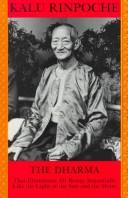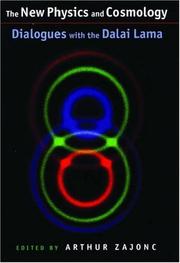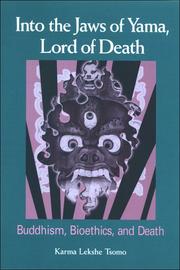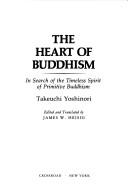| Listing 1 - 10 of 72 | << page >> |
Sort by
|

ISBN: 0585065071 9780585065076 1438408196 9781438408194 0887061567 0887061575 Year: 1986 Publisher: Albany State University of New York Press
Abstract | Keywords | Export | Availability | Bookmark
 Loading...
Loading...Choose an application
- Reference Manager
- EndNote
- RefWorks (Direct export to RefWorks)
Buddhism --- Buddhist doctrines --- Buddhist theology --- Lamaist doctrines --- Doctrines.
Book
ISBN: 1685710352 Year: 2022 Publisher: Goleta, California : Punctum Books,
Abstract | Keywords | Export | Availability | Bookmark
 Loading...
Loading...Choose an application
- Reference Manager
- EndNote
- RefWorks (Direct export to RefWorks)
In the early twentieth century, Uchiyama Gudō, Seno'o Girō, Lin Qiuwu, and others advocated a Buddhism that was radical in two respects. Firstly, they adopted a more or less naturalist stance with respect to Buddhist doctrine and related matters, rejecting karma or other supernatural beliefs. And secondly, they held political and economic views that were radically anti-hegemonic, anti-capitalist, and revolutionary. Taking the idea of such a "radical Buddhism" seriously, A Buddha Land in This World: Philosophy, Utopia, and Radical Buddhism asks whether it is possible to develop a philosophy that is simultaneously naturalist, anti-capitalist, Buddhist, and consistent. Rather than a study of radical Buddhism, then, this book is an attempt to radicalize it. The foundations of this "radicalized radical Buddhism" are provided by a realist interpretation of Yogācāra, elucidated and elaborated with some help from thinkers in the broader Tiantai/Tendai tradition and American philosophers Donald Davidson and W.V.O. Quine. A key implication of this foundation is that only this world and only this life are real, from which it follows that if Buddhism aims to alleviate suffering, it has to do so in this world and in this life. Twentieth-century radical Buddhists (as well as some engaged Buddhists) came to a similar conclusion, often expressed in their aim to realize "a Buddha land in this world. Building on this foundation, but also on Mahāyāna moral philosophy, this book argues for an ethics and social philosophy based on a definition of evil as that what is or should be expected to cause death or suffering. On that ground, capitalism should be rejected indeed, but utopianism must be treated with caution as well, which raises questions about what it means - from a radicalized radical Buddhist perspective - to aim for a Buddha land in this world.
Buddhism --- Doctrines. --- Philosophy. --- Buddhist doctrines --- Buddhist theology --- Lamaist doctrines
Book
ISBN: 8179360105 9788179360101 Year: 2003 Publisher: Pitampura, New Delhi VEDAMS
Abstract | Keywords | Export | Availability | Bookmark
 Loading...
Loading...Choose an application
- Reference Manager
- EndNote
- RefWorks (Direct export to RefWorks)
Nirvana. --- Buddhism --- Buddhist doctrines --- Buddhist theology --- Lamaist doctrines --- Eightfold Path --- Eschatology --- Doctrines. --- Doctrines --- Nirvana --- Psychology

ISBN: 0199882835 1280503076 019534782X 160256891X 9780195347821 9780195159943 0195159942 9781602568914 0197732453 Year: 2004 Publisher: New York : Oxford University Press,
Abstract | Keywords | Export | Availability | Bookmark
 Loading...
Loading...Choose an application
- Reference Manager
- EndNote
- RefWorks (Direct export to RefWorks)
What happens when the Dalai Lama meets with five leading physicists and a historian? This book documents their discussions about theoretical quantum physics and Buddhist philosophy. This book is a contribution to the science-religion interface, and a useful explanation of our basic understanding of quantum reality.
Physics --- Quantum theory --- Buddhism --- Buddhist doctrines --- Buddhist theology --- Lamaist doctrines --- Religious aspects --- Buddhism. --- Doctrines.

ISBN: 079148145X 1429411902 9781429411905 0791468313 0791468321 9780791468319 9780791468326 9780791481455 Year: 2006 Publisher: Albany State University of New York Press
Abstract | Keywords | Export | Availability | Bookmark
 Loading...
Loading...Choose an application
- Reference Manager
- EndNote
- RefWorks (Direct export to RefWorks)
"This book explores the Buddhist view of death and its implications for contemporary bioethics. Writing primarily from within the Tibetan tradition, author Karma Lekshe Tsomo discusses Buddhist notions of human consciousness and personal identity and how these figure in the Buddhist view of death. Beliefs about death and enlightenment and states between life and death are also discussed. Tsomo goes on to examine such hot-button topics as cloning, abortion, assisted suicide, euthanasia, organ donation, genetic engineering, and stem-cell research within a Buddhist context, introducing new ways of thinking about these highly controversial issues."--Jacket
Buddhism --- Intermediate state --- Death --- Buddhist doctrines --- Buddhist theology --- Lamaist doctrines --- Doctrines. --- Buddhism. --- Religious aspects
Book
ISBN: 0585316775 9780585316772 1438406606 Year: 1999 Publisher: Albany, N.Y. : State University of New York Press,
Abstract | Keywords | Export | Availability | Bookmark
 Loading...
Loading...Choose an application
- Reference Manager
- EndNote
- RefWorks (Direct export to RefWorks)
"By uniquely using Buddhist teachings, Reinventing the Wheel assesses the personal and communal costs of our global economic and technological commitments. Hershock urges reinvention of the technological "wheel," and, at the same time acknowledges the need for new forms of practice suited to our rapidly evolving social, political, and economic circumstances. His persuasive presentation urges the skillful spinning of a new "wheel of the dharma.""--Jacket.
Information technology --- Buddhism --- Buddhist doctrines --- Buddhist theology --- Lamaist doctrines --- Religious aspects --- Buddhism. --- Social aspects. --- Doctrines.
Book
ISBN: 1441618651 9781441618658 1438426968 9781438426969 Year: 2009 Publisher: Albany, N.Y. State University of New York Press
Abstract | Keywords | Export | Availability | Bookmark
 Loading...
Loading...Choose an application
- Reference Manager
- EndNote
- RefWorks (Direct export to RefWorks)
What do we need to do to become truly comfortable—at one—with our lives here and now? In these essays, Buddhist social critic and philosopher David R. Loy discusses liberation not from the world, but into it. Loy's lens is a wide one, encompassing the classic and the contemporary, the Asian, the Western, and the comparative. Loy seeks to distinguish what is vital from what is culturally conditioned and perhaps outdated in Buddhism and also to bring fresh worldviews to a Western world in crisis. Some basic Buddhist teachings are reconsidered and thinkers such as Nagarjuna, Dogen, Eckhart, Swedenborg, and Zhuangzi are discussed. Particularly contemporary concerns include the effects of a computerized society, the notion of karma and the position of women, terrorism and the failure of secular modernity, and a Buddhist response to the notion of a clash of civilizations. With his unique mix of Buddhist philosophical insight and passion for social justice, Loy asks us to consider when our awareness, or attention, is bound in delusion and when it is unbound and awakened.
Buddhism --- Religion --- Philosophy & Religion --- Buddhist doctrines --- Buddhist theology --- Lamaist doctrines --- Doctrines. --- Doctrines

ISBN: 0429239378 1136803823 1283963760 0203827783 9781136803826 9780203827789 0700715932 9780700715930 0700715940 9780700715947 9780429239373 9781283963763 9781136803772 9781136803819 1136803815 Year: 2003 Publisher: London New York RoutledgeCurzon
Abstract | Keywords | Export | Availability | Bookmark
 Loading...
Loading...Choose an application
- Reference Manager
- EndNote
- RefWorks (Direct export to RefWorks)
Action Dharma charts the emergence of a new chapter in an ancient faith - the rise of social service and political activism in Buddhist Asia and the West. Fourteen new essays treat the historical origins, global range, teachings and practices, and leaders and organizations that make up the latest turning of the Dharma. Environmentalism and peace walks through the minefields of Southeast Asia, the future of the 'untouchables' of Japan, and outreach to minorities and inmates of the criminal justice system in the West are some of the challenging topics considered.
Buddhism --- Buddhist doctrines --- Buddhist theology --- Lamaist doctrines --- Social aspects. --- Doctrines. --- Buddhism - Social aspects. --- Buddhism - Doctrines.
Book
ISBN: 1684031206 1684031192 9781684031207 9781684031191 1684031184 9781684031184 Year: 2018 Publisher: Oakland, CA : Reveal Press,
Abstract | Keywords | Export | Availability | Bookmark
 Loading...
Loading...Choose an application
- Reference Manager
- EndNote
- RefWorks (Direct export to RefWorks)
"The beginning of a relationship is always thrilling--butterflies in the stomach; that sense that someone really gets you; that "love drunk," "walking on air" feeling. But as time goes by, and the tedium of daily life intervenes, you may find yourself too busy, tired, or just unmotivated to devote quality time and attention to the connection you crave. So, how do you uncover the passion and thrill you're longing for, and how can you make it last? Inside Buddha's Bedroom, you'll discover how the essential Buddhist teachings of mindfulness and awakening can be applied to your love life--showing that true passion absolutely is sustainable, if you're willing to shift your perspective. By exploring your deepest desires and expectations, and also learning to see your partner as they really are, without the need for them to change, you'll be able to create a deep and mindfully loving connection for a fabulous relationship. And with these spiritually scintillating tips and techniques, you'll have the keys to igniting and sustaining all the thrill, intimacy, and sensuality you seek."--
Sex --- Buddhism --- Buddhist doctrines --- Buddhist theology --- Lamaist doctrines --- Religious aspects --- Buddhism. --- Doctrines.

ISBN: 0824505778 Year: 1983 Publisher: New York Crossroad
Abstract | Keywords | Export | Availability | Bookmark
 Loading...
Loading...Choose an application
- Reference Manager
- EndNote
- RefWorks (Direct export to RefWorks)
Indian religions --- Japan --- Buddhism --- Buddhist doctrines --- Buddhist theology --- Lamaist doctrines --- Doctrines
| Listing 1 - 10 of 72 | << page >> |
Sort by
|

 Search
Search Feedback
Feedback About UniCat
About UniCat  Help
Help News
News